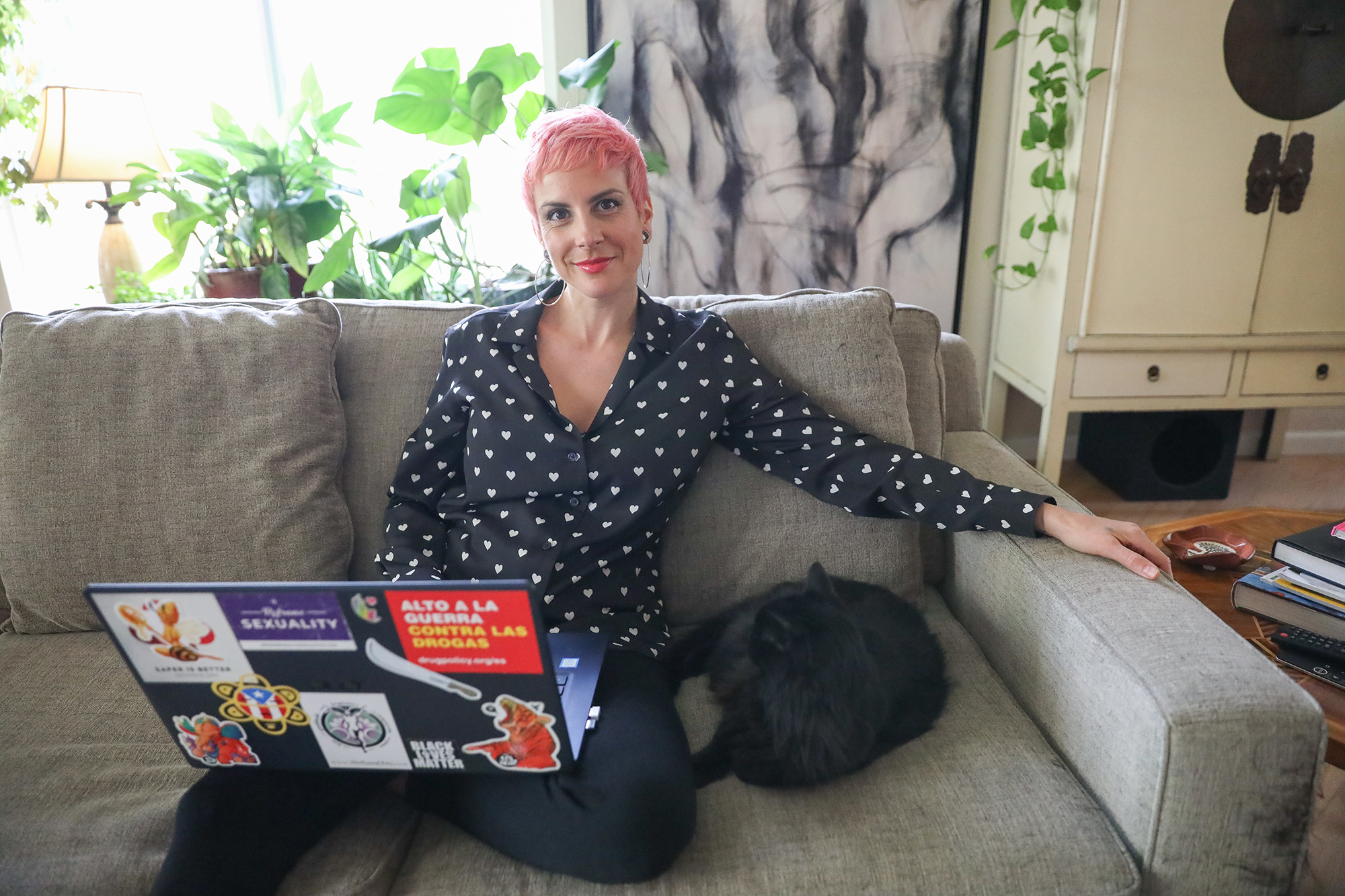By Kyli Rodriguez-Cayro
People who use drugs and those engaged in sex work can face similar challenges—stigma, denial of health care, the risk of experiencing violence. Criminalization of behaviors and a punitive approach to the issue is at the root of these harmful outcomes and many more.
Advocates for sex worker rights and drug policy reform are on the front lines of the harm reduction movement, providing services, mutual aid and community outreach using a compassionate approach based on public health. They have also played a critical role advocating for the divestment from punitive approaches to the sex trade and drug use. Similar to drug decriminalization, many advocates are calling for governments to decriminalize sex work to improve the health and socioeconomic outcomes of sex workers, as well as human trafficking survivors.
Justice Rivera, an author and sex worker rights and harm reduction consultant, recently published a book, “Towards Bodily Autonomy: A Healing Justice Anthology Decolonizing Sex Work and Drug Use,” that explores the connection between the drug war and criminalization of sex work through the voices and stories of people affected.
Vital Strategies spoke with Rivera about the book, how communities can better support sex workers and people who use drugs through policy reform and harm reduction, and what collective liberation looks like.
What is “Towards Bodily Autonomy” about?
“Towards Bodily Autonomy” is a collection of intersectional articles, interviews, worksheets and prompts that explain and problematize current laws and attitudes towards sex work and drug use in the United States. With representation by Black, Indigenous and People of Color (BIPOC) activists and writers, the anthology moves from historical analysis and practical femme-centered harm reduction strategies to discussing the healing applications of sex and drugs and visionary pathways towards bodily autonomy. Overall, the book provides language and inspiration to guide us towards collective liberation, anti-criminalization and healing justice. It is both a blueprint and a prayer for what’s possible.
Why is decriminalizing sex work and drug use so important? What are the harms associated with the criminalization of sex work and drug use?
Criminalization is a violent strategy of an exploitative criminal legal system, so it can never actually create safety. Knowledge makes us safer, connection makes us safer, resourcing makes us safer; however, these things are all criminalized. Decriminalization can make us safer. It allows us to connect with each other to gain and share knowledge and resources. But decriminalization might not be enough. “Towards Bodily Autonomy” shows how wins in drug policy reform shift drug war mechanisms and enforcement towards the sex trade.
The U.S. is playing control whack-a-mole against anyone who doesn’t fit the idea of the cishet white American for whom this country was constructed. Anti-criminalization looks at the numerous overlapping ways that identities and survival are punished and encourages us to reframe and rebuild our systems and approaches. Anti-criminalization can prevent gender-based violence, sex trafficking, overdose, and disease by acknowledging the places where harm overlaps and removing the large layer of political restriction surrounding our daily existence and survival. It is important because then resources can be de-vested from harmful and ineffective carceral systems and be reinvested into communities and community-based safety networks.
How can communities better support sex workers and people who use drugs?
Our liberation is all tied together. Better support means creating policies, programs and practices for the most marginalized among us. It means moving away from liability and scarcity towards trust and care. It means listening to and resourcing people who trade sex and people who use drugs from multiple different backgrounds and experiences. “Towards Bodily Autonomy” provides more information on how to do this. As to why, I’ll leave you with this quote by Martin Niemöller:
“First they came for the socialists, and I did not speak out—because I was not a socialist. Then they came for the trade unionists, and I did not speak out—because I was not a trade unionist. Then they came for the Jews, and I did not speak out—because I was not a Jew. Then they came for me—and there was no one left to speak for me.”
To learn more about Justice Rivera’s publications and work, including “Towards Bodily Autonomy,” please visit www.justiceriverawrites.com
Kyli Rodriguez-Cayro is the content manager for the Overdose Prevention Program at Vital Strategies.
Additional resources from Project SAFE and Vital Strategies:
Vital Strategies has supported the efforts of sex work organizations in the harm reduction space. Project SAFE, a Philadelphia-based mutual aid harm reduction collective led by people who use drugs and are involved in sex work, published the guide Using Drugs Alone with support from Vital Strategies. This resource was created by and for people who use drugs, offering strategies and tips to address and reduce the potential harms of using drugs alone.
Survival Strategies for People Who Use Drugs was created by Project SAFE in tandem with the Using Drugs Alone guide. In addition to sharing the information from the guide, this toolkit offers suggestions for effective harm reduction and public health messaging with regards to never use alone.
Get Our Latest Public Health News
Join our email list and be the first to know about our public health news, publications and interviews with experts.
